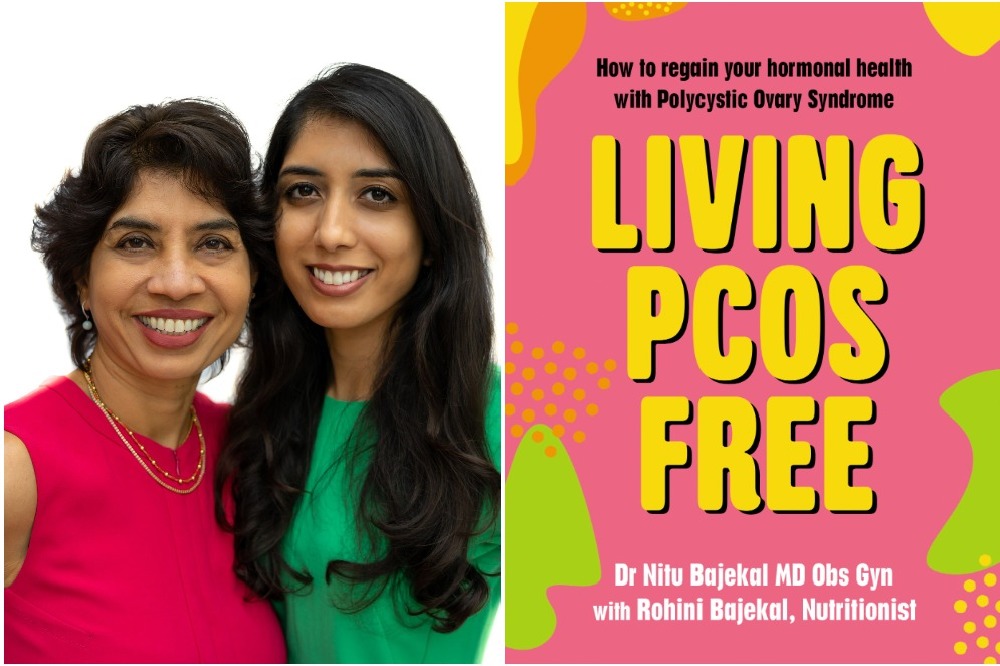Polycystic Ovarian Syndrome (PCOS) is the most common endocrine disorder worldwide, affecting at least 1 in 10 women and people assigned female at birth (AFAB).

Nitu Bajekal and Rohini Bajekal (Kate Lindeman), Living PCOS Free
It is a complex condition that affects the way the ovaries function, resulting in a wide range of reproductive, metabolic, and psychological symptoms that affect women differently. PCOS is often simplified as a fertility issue as it is the leading cause of infertility worldwide. However, PCOS and its complications are woefully underrepresented both in scientific research and mainstream conversations. · It is estimated that as many as three-quarters of those living with PCOS remain undiagnosed. The social stigma often associated with common symptoms, such as weight gain, scalp hair loss, acne, irregular periods and excess hair growth, means many women do not talk about it openly or seek the help they deserve.
PCOS is a condition heavily influenced by our lifestyle — how we eat, sleep, move, stress, interact and so on. All national and international guidelines recommend lifestyle changes to be the first line of management for PCOS, even before medications.
Many women are told that losing weight is the only solution to improving their PCOS with little guidance or support. In fact, 20% of those with PCOS have lean PCOS and are within the “healthy” BMI range, yet still struggle with the symptoms.
While the exact causes of PCOS are unknown, insulin resistance, when insulin levels rise as tissues become resistant to the action of insulin, is considered to be responsible for many of its symptoms. As women with PCOS have a higher risk of type 2 diabetes, gestational diabetes (diabetes during pregnancy), womb cancer and heart disease, focusing on eating predominantly whole plant foods can help reduce the risk of these chronic diseases. This is because eating foods rich with fibre found in a colourful and varied plant-based diet pattern helps promote healthy gut bacteria, reduces inflammation and oxidative stress, normalising blood sugars and lowering insulin resistance.
So, what should you eat when you have PCOS? Enjoy minimally processed intact whole grains such as brown rice, quinoa, legumes (beans, lentils, tofu, edamame beans, tempeh, peas), fruit, vegetables (especially of the green leafy kind), starches such as sweet potatoes, nuts and seeds, herbs and spices. Aim for two daily portions of minimally processed soya foods, such as tofu, tempeh, soya milk and edamame. These soya foods are naturally rich in isoflavones, compounds that have oestrogen-like effects. These are also rich in iron, potassium, B vitamins and protein. By focusing on improving insulin resistance through nutrition and lifestyle changes, you will be able to address many of the troublesome symptoms of PCOS such as irregular periods, weight gain and acne.
Rather than focusing solely on weight loss as a goal, focus on sustainable lifestyle changes and an overall colourful plant-based dietary pattern. Ensure a regular sleep routine with seven to nine hours of restorative sleep, enjoy a diet that is rich in fruits and vegetables, spend time with those who make you feel good, avoid tobacco, excess alcohol/ caffeine, and consider exercise, meditation, mindfulness, community work, psychotherapy or yoga to help manage stress levels.
Living PCOS Free (Hammersmith Health Books) by Dr Nitu Bajekal and Rohini Bajekal is out today, 28th April 2022. This practical guide will show you how to successfully manage your condition using proven lifestyle approaches alongside western medicine. With over 35 years of clinical experience, Dr Nitu Bajekal, AKA 'the 'Plant-Based Gynae,' breaks through misinformation, providing clarity and support to help you tackle your symptoms - from irregular periods to acne and anxiety. The book features an easy-to-follow 21-day plan for hormonal health along with plant-based recipes and illuminating case histories.
www.rohinibajekal.com
www.nitubajekal.com
Scientific references:
Deswal, R., Narwal, V., Dang, A., & Pundir, C. S. (2020). The Prevalence of Polycystic Ovary Syndrome: A Brief Systematic Review. Journal of human reproductive sciences, 13(4), 261–271. https://doi.org/10.4103/jhrs.JHRS_95_18
Khani B, Mehrabian F, Khalesi E, Eshraghi A. Effect of soy phytoestrogen on metabolic and hormonal disturbance of women with polycystic ovary syndrome. Journal of research in medical sciences : the official journal of Isfahan University of Medical Sciences. 2011 Mar;16(3).
Hooper L, Ryder JJ, Kurzer MS, Lampe JW, Messina MJ, Phipps WR, et al. Effects of soy protein and isoflavones on circulating hormone concentrations in pre- and post-menopausal women: a systematic review and meta-analysis. Human Reproduction Update. 2009;15(4).
Messina M. Insights Gained from 20 Years of Soy Research. The Journal of Nutrition. 2010 Dec 1;140(12).
Li S, Miao S, Huang Y, Liu Z, Tian H, Yin X, et al. Fruit intake decreases risk of incident type 2 diabetes: an updated meta-analysis. Endocrine. 2015 Mar 30;48(2).
Lim SS, Hutchison SK, van Ryswyk E, Norman RJ, Teede HJ, Moran LJ. Lifestyle changes in women with polycystic ovary syndrome. Cochrane Database of Systematic Reviews. 2019 Mar 28;2019(3).
McMacken M. A plant-based diet for the prevention and treatment of type 2 diabetes. Journal of Geriartric Cardiology [Internet]. 2017 May [cited 2021 Nov 6]; Available from: https://www.ncbi.nlm.nih.gov/pmc/articles/PMC5466941/
Cutler, D. A., Pride, S. M., & Cheung, A. P. (2019). Low intakes of dietary fiber and magnesium are associated with insulin resistance and hyperandrogenism in polycystic ovary syndrome: A cohort study. Food science & nutrition, 7(4), 1426–1437. https://doi.org/10.1002/fsn3.977
Wolf, W. M., Wattick, R. A., Kinkade, O. N., & Olfert, M. D. (2018). Geographical Prevalence of Polycystic Ovary Syndrome as Determined by Region and Race/Ethnicity. International journal of environmental research and public health, 15(11), 2589. https://doi.org/10.3390/ijerph15112589


